甘地生平【英文】
- 格式:ppt
- 大小:2.95 MB
- 文档页数:20
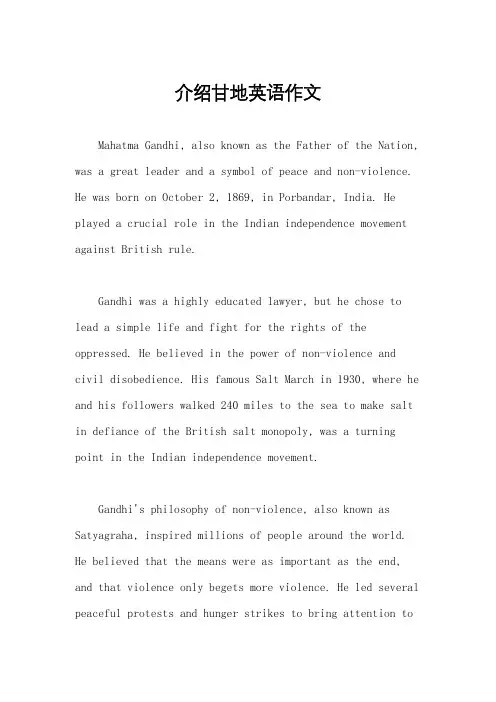
介绍甘地英语作文Mahatma Gandhi, also known as the Father of the Nation, was a great leader and a symbol of peace and non-violence. He was born on October 2, 1869, in Porbandar, India. He played a crucial role in the Indian independence movement against British rule.Gandhi was a highly educated lawyer, but he chose to lead a simple life and fight for the rights of the oppressed. He believed in the power of non-violence andcivil disobedience. His famous Salt March in 1930, where he and his followers walked 240 miles to the sea to make salt in defiance of the British salt monopoly, was a turning point in the Indian independence movement.Gandhi's philosophy of non-violence, also known as Satyagraha, inspired millions of people around the world. He believed that the means were as important as the end, and that violence only begets more violence. He led several peaceful protests and hunger strikes to bring attention tothe injustices of British rule in India.Gandhi's impact extended far beyond India. Hisinfluence on civil rights movements in the United States, South Africa, and other parts of the world is well-documented. Leaders like Martin Luther King Jr. and Nelson Mandela were inspired by Gandhi's principles of non-violence and used them to bring about social change intheir own countries.Gandhi's commitment to social justice and his unwavering belief in the power of non-violence continue to inspire people around the world. His legacy lives on in the hearts of those who continue to fight for equality, justice, and peace.In conclusion, Mahatma Gandhi was a visionary leaderwho dedicated his life to the pursuit of truth and justice. His philosophy of non-violence and civil disobedience has had a lasting impact on the world. He remains a symbol of hope and inspiration for people everywhere. Gandhi'steachings continue to be relevant today, and his legacy will continue to inspire generations to come.。

Mahatma Gandhi>Mahatma Gandhi Essay in English (ममममममममममममममममममममममममम): Mahatma Gandhi, an apostle of non-violence and preacher of truth, was born on October 2nd, 1869 in Gujarat. He belonged to a well-to-do family. Throughout his school days, he remained a shy boy but was a good and regular student. He later went to England to study law and became a barrister. Then he returned to India and began to practice at the Bombay High Court. But he was not very interested in the legal profession. So, he j oined the struggle for India’s Independence.Long and Short Essays About GandhijiHe went to South Africa. There, he made his best efforts to improve a lot of the Indians. He underwent all the sufferings but remained steadfast in his convictions.He could not bear the miserable plight of Indian masses suffering and starving under British rule. In order to uproot the Britishers from the Indian soil, Mahatma Gandhi sacrificed everything.His entire life is a saga of valor and sacrifices. Freedom was the br eath of Mahatma Gandhi’s life. In 1919 he started a non-violent andpeaceful movement. Hindu-Muslim unity, removal of untouchability and usage of Swadeshi (domestic-made) goods were his life-long missions. He launched the ‘Khadi Movement’ to encourage the use of handspun fibers like khadi or jute. ‘Khadi Movement’ was part of a bigger movement “Non¬co-operation Movement” which encouraged the use of Indian goods and boycotting of foreign goods.Get a > Mahatma Gandhi and >10 Lines on Mahatma Gandhi for Students and Children in EnglishEssay On Mahatma Gandhi in English (मममममममममममममममममममममममममम)Mahatma Gandhi was a man of sound and strong convictions. He had a noble soul. He wore very simple clothes and took simple vegetarian food. He was not only a man of words but also of action. He practiced what he preached. His approach to various problems was non-violent. He was a God-fearing person. He was the cynosure of all the eyes. He hated communalism in every shape or form. He was a friend of all and an enemy of none. He wasuniversally loved and liked. That’s why Indian masses bestowed him with the title ‘Mahatma’.The part played by Mahatma Gandhi on the stage of Indian politics is unforgettable. In those stormy days of the struggle for Indian Independence, Gandhi suffered and was imprisoned several times but freedom of his motherland remained his cherished goal. He guided many freedom struggles and launched the “Quit India Movement.”Conclusion on Mahatma Gandhi EssayHis tragic death on January 30th, 1948, plunged the entire nation into the gloom. He was assassinated by a Hindu frantic. His death was the greatest blow to the forces of peace and democracy. The memorable words of Lord Mountbatten are worth quoting, “India, indeed the world, will not see the likes of him perhaps for centuries.” His death left a great vacuum in the life of the nation. His birthday 2nd October is commemorated as ‘Gandhi Jayanti’, a national holiday in Indian, and worldwide as the ‘International Day of Non-violence’.The whole world still loves and respects this veteran of the twentieth century who has left an indelible mark on the sands of time.FAQ’s On Mahatma Gandhi EssayQuestion 1.What is the essay of Mahatma Gandhi?Answer:Mahatma Gandhi, an apostle of non-violence and preacher of truth, was born on October 2nd, 1869 in Gujarat. He belonged to a well-to-do family.Question 2.Why is Mahatma Gandhi called Father of Nation?Answer:Mahatma Gandhi is called as Father of Nation because he is the person who divides India from foreign dominations and established India as a nation.Question 3.Who was the father of the nation explain in a hundred words?Answer:Father of Nation is Mahatma Gandhi, his full name is Mohandas Karamchand Gandhi. He was conferred by Mahatma which means great soul and this name was given by his great friend Rabindranath Tagore. Gandhi was born at Porbandar in Gujarat in October 2nd, 1869.。

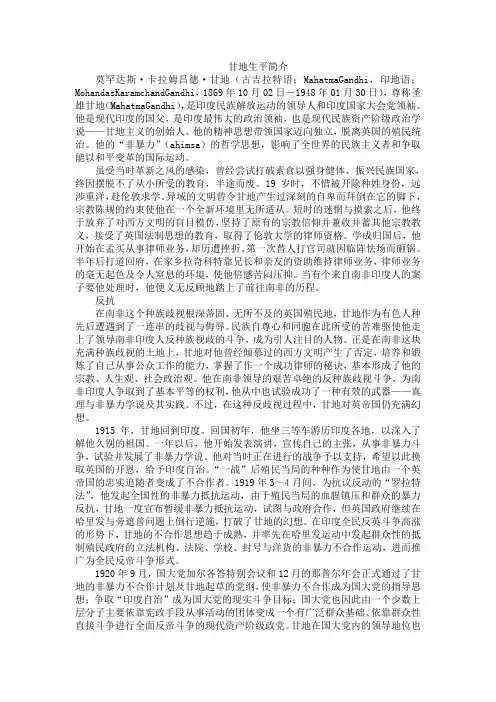
甘地生平简介莫罕达斯·卡拉姆昌德·甘地(古吉拉特语;MahatmaGandhi,印地语;MohandasKaramchandGandhi,1869年10月02日-1948年01月30日),尊称圣雄甘地(MahatmaGandhi),是印度民族解放运动的领导人和印度国家大会党领袖。
他是现代印度的国父,是印度最伟大的政治领袖,也是现代民族资产阶级政治学说——甘地主义的创始人。
他的精神思想带领国家迈向独立,脱离英国的殖民统治。
他的“非暴力”(ahimsa)的哲学思想,影响了全世界的民族主义者和争取能以和平变革的国际运动。
虽受当时革新之风的感染,曾经尝试打破素食以强身健体、振兴民族国家,终因摆脱不了从小所受的教育,半途而废。
19岁时,不惜被开除种姓身份,远涉重洋,赴伦敦求学。
异域的文明曾令甘地产生过深刻的自卑而拜倒在它的脚下,宗教陈规的约束使他在一个全新环境里无所适从。
短时的迷惘与摸索之后,他终于放弃了对西方文明的盲目模仿,坚持了原有的宗教信仰并兼收并蓄其他宗教教义,接受了英国法制思想的教育,取得了伦敦大学的律师资格。
学成归国后,他开始在孟买从事律师业务,却历遭挫折。
第一次替人打官司就因临阵怯场而砸锅。
半年后打道回府,在家乡拉奇科特靠兄长和亲友的资助维持律师业务,律师业务的毫无起色及令人窒息的环境,使他倍感苦闷压抑。
当有个来自南非印度人的案子要他处理时,他便义无反顾地踏上了前往南非的历程。
反抗在南非这个种族歧视根深蒂固、无所不及的英国殖民地,甘地作为有色人种先后遭遇到了一连串的歧视与侮辱。
民族自尊心和同胞在此所受的苦难驱使他走上了领导南非印度人反种族视歧的斗争,成为引人注目的人物。
正是在南非这块充满种族歧视的土地上,甘地对他曾经倾慕过的西方文明产生了否定,培养和锻炼了自己从事公众工作的能力,掌握了作一个成功律师的秘诀,基本形成了他的宗教、人生观、社会政治观。
他在南非领导的艰苦卓绝的反种族歧视斗争,为南非印度人争取到了基本平等的权利,他从中也试验成功了一种有效的武器——真理与非暴力学说及其实践。
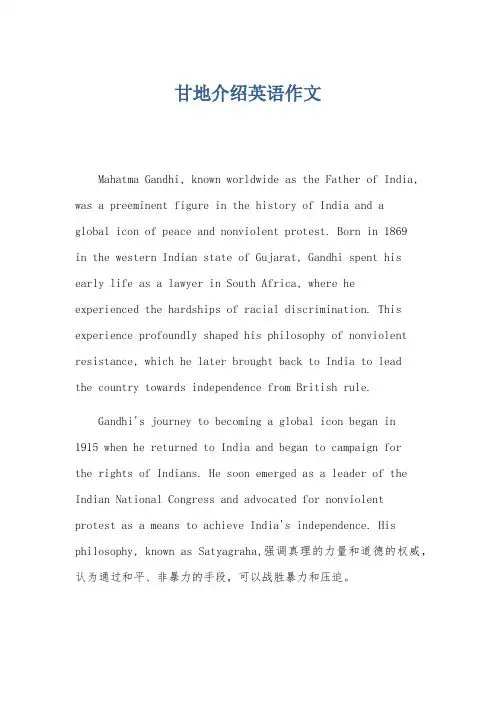
甘地介绍英语作文Mahatma Gandhi, known worldwide as the Father of India, was a preeminent figure in the history of India and aglobal icon of peace and nonviolent protest. Born in 1869in the western Indian state of Gujarat, Gandhi spent his early life as a lawyer in South Africa, where heexperienced the hardships of racial discrimination. This experience profoundly shaped his philosophy of nonviolent resistance, which he later brought back to India to leadthe country towards independence from British rule.Gandhi's journey to becoming a global icon began in1915 when he returned to India and began to campaign forthe rights of Indians. He soon emerged as a leader of the Indian National Congress and advocated for nonviolentprotest as a means to achieve India's independence. His philosophy, known as Satyagraha,强调真理的力量和道德的权威,认为通过和平、非暴力的手段,可以战胜暴力和压迫。
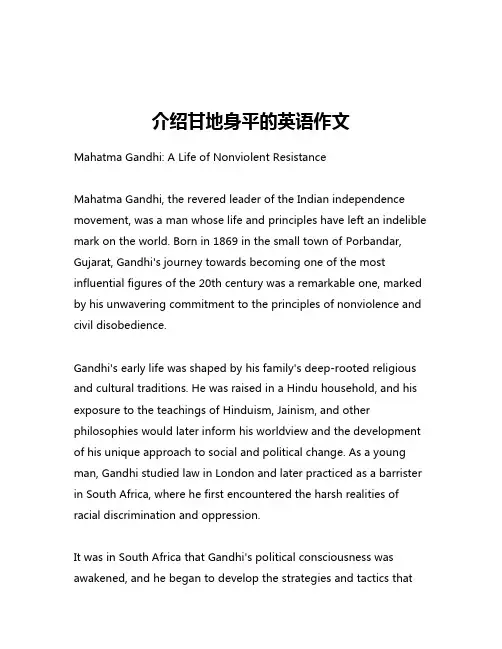
介绍甘地身平的英语作文Mahatma Gandhi: A Life of Nonviolent ResistanceMahatma Gandhi, the revered leader of the Indian independence movement, was a man whose life and principles have left an indelible mark on the world. Born in 1869 in the small town of Porbandar, Gujarat, Gandhi's journey towards becoming one of the most influential figures of the 20th century was a remarkable one, marked by his unwavering commitment to the principles of nonviolence and civil disobedience.Gandhi's early life was shaped by his family's deep-rooted religious and cultural traditions. He was raised in a Hindu household, and his exposure to the teachings of Hinduism, Jainism, and other philosophies would later inform his worldview and the development of his unique approach to social and political change. As a young man, Gandhi studied law in London and later practiced as a barrister in South Africa, where he first encountered the harsh realities of racial discrimination and oppression.It was in South Africa that Gandhi's political consciousness was awakened, and he began to develop the strategies and tactics thatwould become the hallmarks of his nonviolent resistance movement. Faced with the unjust treatment of Indian immigrants in the country, Gandhi organized peaceful protests and civil disobedience campaigns, leading to his imprisonment on several occasions. It was during this time that he coined the term "Satyagraha," which translates to "truth-force" or "soul-force," and which would become the guiding principle of his entire political and social movement.Upon his return to India in 1915, Gandhi quickly became a central figure in the Indian independence movement. He recognized that the key to achieving independence from British rule lay not in armed rebellion, but in the power of nonviolent resistance and civil disobedience. Gandhi's tactics, which included the famous Salt March, the Quit India movement, and the Non-Cooperation movement, were designed to undermine the authority of the British government while simultaneously inspiring and empowering the Indian people.One of the most remarkable aspects of Gandhi's leadership was his ability to transcend the boundaries of religion, caste, and class. He believed that true freedom could only be achieved through the unity and cooperation of all Indians, regardless of their background. He worked tirelessly to bridge the divides within Indian society, advocating for the rights of the untouchables and promoting interfaith harmony.Gandhi's commitment to nonviolence was absolute, and he practiced what he preached. Even in the face of brutal repression and violence from the British authorities, he remained steadfast in his refusal to retaliate or resort to violence. His philosophy of nonviolent resistance, which he termed "Ahimsa," was rooted in the belief that the only way to achieve lasting change was through the power of moral persuasion and the transformation of one's adversaries.Throughout his life, Gandhi's personal example and moral leadership inspired millions of people around the world. He was a tireless advocate for the poor and the marginalized, and his vision of a just and equitable society continues to resonate with people of all backgrounds. Even in the face of personal tragedy and setbacks, Gandhi never wavered in his commitment to his principles, and his legacy continues to shape the course of global politics and social movements to this day.In the end, Mahatma Gandhi's life and work stand as a testament to the power of nonviolent resistance and the transformative potential of individual action. His unwavering commitment to truth, justice, and the dignity of all human beings has left an indelible mark on the world, and his legacy will continue to inspire generations to come.。
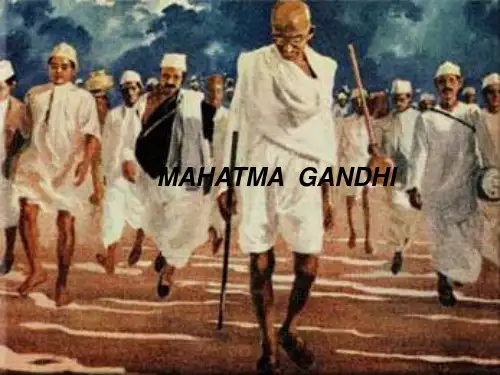

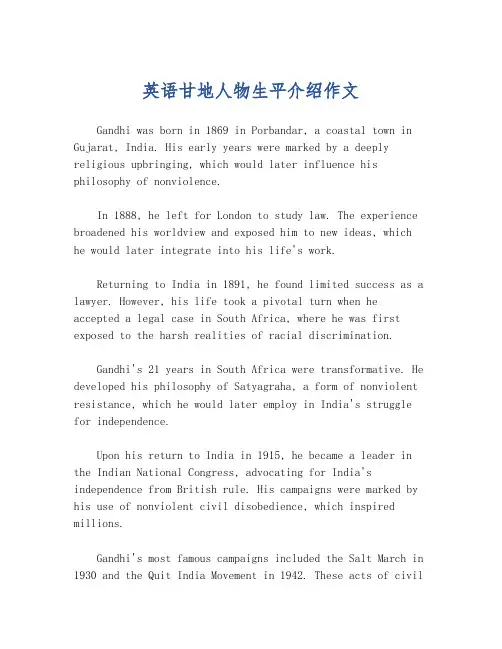
英语甘地人物生平介绍作文Gandhi was born in 1869 in Porbandar, a coastal town in Gujarat, India. His early years were marked by a deeply religious upbringing, which would later influence his philosophy of nonviolence.In 1888, he left for London to study law. The experience broadened his worldview and exposed him to new ideas, which he would later integrate into his life's work.Returning to India in 1891, he found limited success as a lawyer. However, his life took a pivotal turn when he accepted a legal case in South Africa, where he was first exposed to the harsh realities of racial discrimination.Gandhi's 21 years in South Africa were transformative. He developed his philosophy of Satyagraha, a form of nonviolent resistance, which he would later employ in India's struggle for independence.Upon his return to India in 1915, he became a leader in the Indian National Congress, advocating for India's independence from British rule. His campaigns were marked by his use of nonviolent civil disobedience, which inspired millions.Gandhi's most famous campaigns included the Salt March in 1930 and the Quit India Movement in 1942. These acts of civildisobedience were instrumental in shaping the course ofIndia's independence movement.Despite facing imprisonment multiple times, Gandhi remained steadfast in his commitment to nonviolence. His leadership during the partition of India and Pakistan in 1947 was a testament to his unwavering dedication to peace.Tragically, Gandhi was assassinated in 1948 by anextremist who disagreed with his views on religious tolerance. His legacy, however, lives on as a beacon of peace and nonviolence in a world that often seems to lack both.。
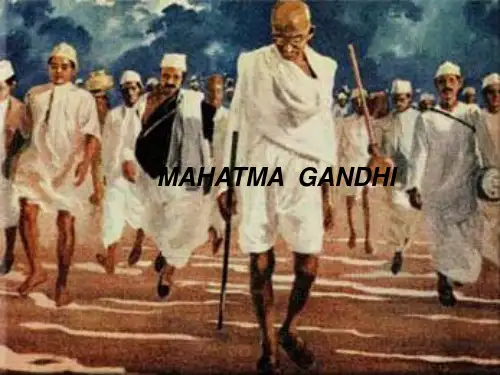

圣雄甘地生平
新甫工作室
本名:莫罕达斯·卡拉姆昌德·甘地(Mohandas Karamchand Gandhi)
1869年10月2日甘地出生在印度西部的古吉拉特邦的博尔本德尔的一个印度教家庭。
1888年十九岁的甘地留学英国,在伦敦大学学习法律;
1893年4月甘地到南非工作,看到印度契约佣工和个体商人移民在南非的公民自由和政治权利被剥夺的现状,他开始抗议和游说,反对针对印度人的法律和种族歧视。
1913年11月6日,甘地因领导一群印度矿工在南非游行而被捕,此后,他先后在1922年、1930年、1933年和1942年4次入狱;
1919年阿姆利则惨案后,甘地以他的公民不服从、不合作和绝食抗议等的政治主张,获得了世界范围的关注;
1920年4月当选为印度自治同盟主席;
1921年12月被授予国大党在印度自治同盟里的执行代表。
在他的领导下,国大党重组,制定了新的章程。
新党章规定党的目标是争取独立。
任何人只要交纳一定的象征性费用就可以入党,国大党由一个精英组织转变成了一个大众化政党。
1930年3月21日甘地领导了他一生中最著名的一次运动:德里游行,即,从德里到阿赫姆达巴德(Ahmedabad)的路程为400公里的游行,数以千计的人们徒步到海边自己取盐而不给政府交税;
1933年5月8日甘地开始了为期21天的绝食,抗议英国在印度的独裁统治。
绝食是甘地的主要斗争方式,一生中他绝食过14次;
1942年甘地与英国驻印度最后两任总督(韦维尔和蒙巴顿)合作制定了印度独立和分治方案;
1948年1月30日刚结束绝食的甘地在前往一个祈祷会的途中被一个印度教狂热分子南度兰姆·高德西枪杀。
甘地的介绍的英文作文Mahatma Gandhi, also known as the Father of the Nation in India, was a prominent leader in the Indian independence movement against British rule. He was born on October 2, 1869, in Porbandar, India.Gandhi is best known for his philosophy of nonviolent resistance, which he called Satyagraha. He led various peaceful protests and civil disobedience campaigns, such as the famous Salt March in 1930, to challenge the British government's oppressive policies.In addition to his political activism, Gandhi was also a devout practitioner of Ahimsa, or nonviolence towards all living beings. He advocated for the rights of the untouchables, promoted religious harmony, and worked towards social and economic equality for all.Gandhi's influence extended beyond India, as heinspired civil rights movements and leaders around theworld, including Martin Luther King Jr. in the UnitedStates and Nelson Mandela in South Africa.Despite facing numerous hardships and being imprisoned several times, Gandhi remained steadfast in his commitmentto peaceful resistance and his belief in the power of love and truth to overcome injustice.Tragically, Gandhi was assassinated on January 30, 1948, by a Hindu nationalist who opposed his inclusive vision for an independent India. However, his legacy lives on as a symbol of hope, courage, and the transformative potentialof nonviolent activism.。
甘地的经历英语作文Title: The Journey of Mahatma Gandhi: A Testament to Leadership and Resilience。
Mahatma Gandhi, an iconic figure in the history ofIndia and the world, embarked on a transformative journey that shaped the course of a nation and inspired generations. His life is a testament to leadership, resilience, and the power of nonviolent resistance in the face of adversity.Gandhi's journey began in humble surroundings in Porbandar, India, where he was born on October 2, 1869. From a young age, he exhibited qualities of compassion, truthfulness, and a deep sense of justice. His upbringing laid the foundation for his later commitment to social reform and nonviolent activism.After completing his education in law in England, Gandhi faced discrimination firsthand, both in South Africa and later in India. These experiences fueled hisdetermination to fight against injustice and oppression. In South Africa, he became a prominent leader in the Indian community, organizing protests and campaigns against discriminatory laws such as the Asiatic Registration Act and the Poll Tax.Gandhi's philosophy of nonviolent resistance, known as Satyagraha, emerged during his time in South Africa. He believed in the power of truth and moral force to confront and overcome injustice, rather than resorting to violence. This principle would become the cornerstone of his leadership in India's struggle for independence.Upon his return to India in 1915, Gandhi immersed himself in the freedom movement, advocating for the rights of peasants, laborers, and the oppressed. He led several campaigns, including the Non-Cooperation Movement and the Salt March, which galvanized millions of Indians in their quest for freedom from British rule.Despite facing imprisonment, violence, and personal hardships, Gandhi remained steadfast in his commitment tononviolence and reconciliation. He famously declared, "An eye for an eye only ends up making the whole world blind." His unwavering dedication to peaceful resistance inspired millions around the world and earned him the title of "Mahatma," meaning "Great Soul."Gandhi's leadership extended beyond politics to encompass social and economic reform. He championed causes such as the eradication of untouchability, promotion of religious harmony, and empowerment of women. His emphasis on self-reliance and community development laid the groundwork for India's future progress.The legacy of Mahatma Gandhi transcends borders and generations. His principles of truth, nonviolence, and compassion continue to resonate with people striving for justice and equality worldwide. From Martin Luther King Jr. and Nelson Mandela to contemporary activists, Gandhi's influence endures as a beacon of hope and inspiration.In conclusion, Mahatma Gandhi's journey is a testament to the power of leadership, resilience, and nonviolentresistance in the face of adversity. His life serves as a reminder that individuals, no matter their background or circumstances, can effect profound change through courage, conviction, and compassion. Gandhi's legacy reminds us that the path to a better world begins with the courage to stand up for what is right and the humility to seek truth and reconciliation.。
甘地的英语作文Mahatma Gandhi, born on October 2, 1869, in Porbandar, India, is a figure of global significance whose philosophy and practices continue to inspire millions around the world. Known as the "Father of the Nation" in India, Gandhi's life and teachings have left an indelible mark on the history of civil disobedience and nonviolent resistance.Gandhi's journey to becoming a symbol of peace and nonviolence was a long and arduous one. He began his career as a lawyer in South Africa, where he experienced firsthand the injustices of racial discrimination. This experience ignited in him a passion for justice and equality, leading him to develop his philosophy of Satyagraha, a commitment to truth and nonviolent protest.Upon returning to India, Gandhi became a leading figure in the Indian National Congress, advocating for India's independence from British rule. His methods, which included civil disobedience, non-cooperation, and the famous Salt March, were instrumental in mobilizing the masses and challenging the colonial authorities.Gandhi's English was not just a means of communication; it was a tool for his political and social activism. He was a prolific writer and editor, publishing articles in his newspaper "Young India" and "Navjivan," where he articulated his vision for a free and just India. His ability tocommunicate in English allowed him to reach a wider audience, including the British officials he sought to persuade.One of Gandhi's most significant contributions to the world was his unwavering commitment to nonviolence. He believedthat violence begets violence and that only through peaceful means could lasting change be achieved. This philosophy was not only applied to the struggle for Indian independence but also to the resolution of conflicts and the pursuit of social justice globally.Gandhi's legacy extends beyond the borders of India and into the hearts and minds of those who advocate for peace. His teachings have influenced civil rights leaders such as Martin Luther King Jr. and Nelson Mandela, who also adopted nonviolent strategies in their respective struggles.In conclusion, Mahatma Gandhi's life is a testament to the power of nonviolence and the impact one individual can have on the course of history. His use of English as a medium for his message, his strategic nonviolent protests, and his unwavering commitment to truth and justice have made him an enduring symbol of peace and an inspiration to generations of activists. As the world continues to face conflicts and injustices, Gandhi's principles offer a path towards a more harmonious and equitable future.。